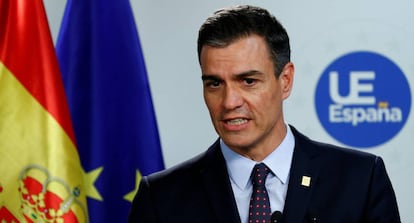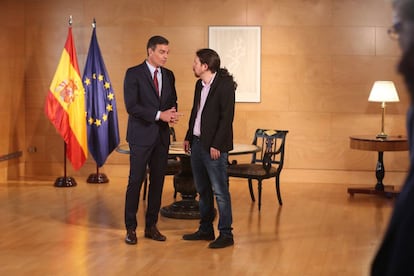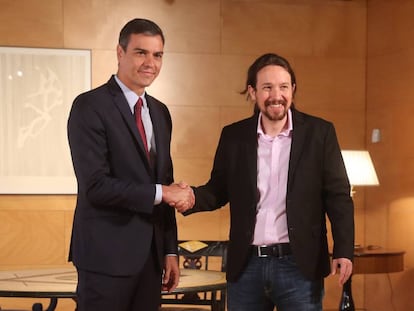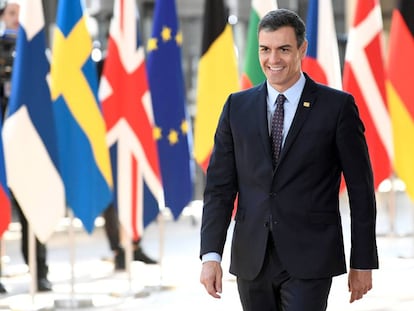Spain’s acting PM wants constitutional change to prevent new stalemates
Pedro Sánchez is facing a congressional investiture vote in two weeks but lacks the required support, raising the specter of a fresh general election

Spain’s acting prime minister, Pedro Sánchez of the Socialist Party (PSOE), wants to change the Constitution to prevent situations of deadlock like the one currently affecting Spanish politics. Although the country held a general election on April 28, Sánchez – who won the most votes but fell shy of an overall majority – has been unable to form a government, raising the specter of a repeat election in November.
If so, it would be the fourth national election in under four years, reflecting a new political fragmentation in a country accustomed to decades of two-party dominance by the PSOE and the Popular Party (PP). The economic crisis spawned two protest parties, Podemos and Ciudadanos, while a third group, the far-right Vox, has made significant inroads since its success at the Andalusian election of December 2018.
A government needs absolute internal cohesion, and on matters of state there are deep discrepancies with Unidas Podemos
Acting PM Pedro Sánchez
Following another failed meeting on Tuesday between Sánchez and Pablo Iglesias, head of the leftist Unidas Podemos group, the acting PM said he would call Iglesias on Thursday to try to kick-start “stalled” negotiations. While Sánchez considers Iglesias his natural ally, he is refusing the latter’s demand for a coalition government.
“A government needs absolute internal cohesion, and on matters of state there are deep discrepancies with Unidos Podemos,” said Sánchez on the morning talk show Los Desayunos de TVE.
One of these differences is over the crisis in Catalonia. An independence drive in the northeastern Spanish region in 2017 saw an illegal referendum on independence held in October of that year, followed by a unilateral declaration of independence passed through the regional government. In response, the then-Popular Party government suspended the region’s autonomous powers and sacked the government. A Supreme Court trial of a dozen of the pro-independence leaders has just concluded, and is pending a ruling and possible jail sentences.

“They talk about political prisoners and the PSOE does not, we say there are politicians in prison,” said Sánchez, who is facing a congressional vote in two weeks to get officially back into the prime minister’s office. So far, he lacks enough support to be successful. “It is evident that there are deep differences and discrepancies that could paralyze a joint government with Unidas Podemos due to internal contradictions. My responsibility is not just to guarantee the investiture, but the stability of government as well.”
Podemos has already offered to accept in writing any conditions set out by the PSOE in connection with the handling of the Catalan crisis. But the response by a Socialist leader at party headquarters on Monday was that “people also sign mortgages, and later don’t pay.”
Rather than a coalition government, the acting PM is suggesting that Unidas Podemos could propose independent candidates to hold some Cabinet positions. “Honestly, to me it seems like the most sensible and generous offer in the current situation,” he said.
Meanwhile, Iglesias said he is confident that Sánchez will come around and stop insisting on “a monochrome government.”
“The logical thing would be for us to reach an agreement and be able to share power,” he said.
The PSOE won the April election with 123 seats in Congress, while Unidas Podemos came in fourth with 42 lawmakers, behind the Popular Party (66) and Ciudadanos (57).
Constitutional change
Sánchez said that Article 99 of the Constitution, which covers the appointment of the new government leader following a confidence vote in Congress, “is not working.”
Under the current rules, the candidate must secure an absolute majority of votes, or else a simple majority in a second round to be held 48 hours later. If the candidate is not successful, there are two months to make a new proposal, after which the king must dissolve parliament and call fresh elections. This is what happened after the December 2015 election, forcing Spaniards to return to the polls in June.
Sánchez held up local councils as an example to follow: when there is no party with an absolute majority and no cross-party deal to create that majority, the most-voted party automatically gets to form a government.
“We need to find a mechanism to allow investitures and prevent negative coalitions that systematically lead to repeat elections. I am offering a national deal to make this the last time that it happens,” said Sánchez.
But Podemos’ Iglesias does not support the constitutional changes proposed by the Socialist leader because they “go against the spirit of the Constitution.” In Spain, he said, there is a parliamentary system as opposed to other countries with presidential or winner-takes-all systems.
English version by Susana Urra.









































